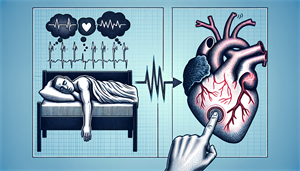
Sleep Apnea and Heart Palpitations
Have you ever experienced an irregular heartbeat during your sleep? This could be a symptom of sleep apnea heart palpitations, a disorder characterized by interrupted breathing during sleep, which can lead to heart palpitations. In essence, these are feelings of a racing or irregular heartbeat and can be quite disconcerting. This blog post will guide you through understanding the link between sleep apnea and heart palpitations, their symptoms, risk factors, diagnosis, treatment, prevention, and much more!
Key Takeaways
-
Sleep apnea is a disorder characterized by repeated stopping and starting of breathing during sleep, which significantly impacts heart health, causing conditions such as myocardial ischemia, heart palpitations, and even heart attacks.
-
Risk factors for developing sleep apnea and heart palpitations include obesity, smoking, stress, hypertension, and diabetes, all of which can contribute to or exacerbate the severity of symptoms.
-
Treatment options to manage sleep apnea and heart palpitations range from Continuous Positive Airway Pressure (CPAP) therapy and lifestyle changes, such as weight loss and smoking cessation, to medications like beta blockers and anti-arrhythmic drugs.
Sleep Apnea and Heart Palpitations: The Connection
Sleep apnea is a medical disorder where breathing repeatedly stops and starts during sleep. This can have various detrimental effects on your heart, causing an irregular heartbeat, heart failure, and even heart attacks. Changes in blood oxygen levels during these episodes lead to a drop in heart rate during sleep and a subsequent increase upon waking to restore normal breathing. This ultimately leads to a medical condition known as myocardial ischemia, caused by insufficient oxygen supply.
Often, people with obstructive sleep apnea have nighttime heart palpitations. Some individuals may experience a stronger heartbeat, while others may notice variations in their heart rate and rhythm. These sensations are common and can be caused by a variety of factors. These palpitations result from changes in intrathoracic pressure and blood oxygen levels, which activate the sympathetic and parasympathetic systems. Sleep apnea, being a type of sleep disordered breathing, can lead to these fluctuations and changes.
Obstructive Sleep Apnea
Obstructive Sleep Apnoea (OSA), also known as obstructive sleep apnea, is the most common type of sleep apnea. It is characterized by:
- Brief pauses in breathing during sleep
- Blocked airway when the muscles supporting the soft tissues in the throat collapse
- Obstruction in the airway primarily caused by complete or partial collapse of the airway
Often linked to anatomical abnormalities or the temporary relaxation of throat muscles. Symptoms of Obstructive Sleep Apnea include:
- Daytime fatigue
- Loud snoring
- Disruptive sleep with snorting or gasping episodes
- Gastroesophageal reflux disease (GERD), which can exacerbate the symptoms and increase the risk of heart palpitations; acid reflux is a common symptom of GERD
- Weight gain, which plays a role in the development of sleep apnea, with fat accumulation in the neck area potentially obstructing breathing.
Central Sleep Apnea
Conversely, Central Sleep Apnea (CSA) is a severe condition marked by disrupted breathing during sleep. This is caused by the brain’s failure to send signals to the breathing muscles, causing individuals to stop breathing for brief periods during sleep. This lack of communication between the brain and the muscles responsible for breathing can lead to inadequate ventilation, compromised gas exchange, and an increased likelihood of experiencing heart palpitations.


